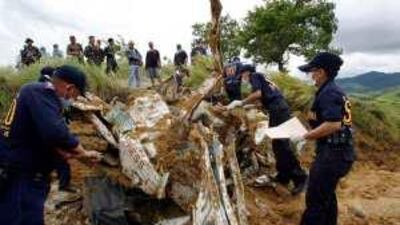Manila // Myrna Reblando looked at the photograph of her dead husband and said, half-jokingly: "I never liked that shirt." Black humour is her way of handling the fact that her husband Bong will never again walk through the front door of their home in General Santos City, on the southern Philippine island of Mindanao, kiss her and ask how her day had gone.
A colour photograph of Bong stares out from the wall of her lawyer's conference room in Manila - a gaping hole in the side of his head and a bloodied blue Hawaiian shirt with boats and yellow sails. Out of view in the photograph are his shattered leg and hands where the fingertips had been cut off. Bong was one of 57 people, including 32 journalists, massacred on November 23 in Maguindanao, a provincial backwater in Muslim Mindanao, where the Ampatuan clan has ruled for more than 10 years and had been close political allies of the president Gloria Macapagal Arroyo, although she has distanced herself from the clan since the massacre.
So far only one man is standing trial for the massacre, Andal Ampatuan Jr, the mayor of Datu Unsay in Maguindanao and the son of the former provincial governor of the same name. Mr Ampatuan is accused of ordering 100 of his men to massacre a convoy carrying supporters of a political rival and journalists who were travelling to the provincial capital to file registration papers for the May 10 election. In February his trial was suspended indefinitely over legal technicalities.
Arrest warrants have been issued against 196 people for their part in the massacre including most of the senior members of the Ampatuan clan, police and supporters but fewer then 90 have been detained. The new acting secretary of justice, Alberto Agra, who was once a leading human rights lawyer, caused an uproar on April 16 when he dropped murder charges against two prominent members of the Ampatuan clan - Zaldy Ampatuan, the suspended governor of the Autonomous Region in Muslim Mindanao, and his cousin Akmad Ampatuan, the former acting vice governor of Maguindanao.
The two men were alleged to have been among the key planners of the massacre that drew condemnation not only within the Philippines but internationally. Amnesty International, in a statement on April 21, said dropping the charges just before the election "smacks of placing politics before justice and human rights". Mrs Reblando said she does not believe justice will come in the dying days of the Arroyo administration. "But justice will come," she said.
Married for 35 years and with seven children, she and relatives of other victims have formed a group called Justice Now! to ensure the massacre does not fade from people's minds, as is often the case in the Philippines. The sheer scale of the attack and its brutality shocked a nation that over the years has become increasingly desensitised to violence. "What happened in Maguindanao was brutal and those involved must be punished," Mrs Reblando said. Bong, who was the Manila Bulletin's correspondent in General Santos, and his colleagues "were just doing their job".
"No one in that convoy deserved to die," she said. Mrs Reblando travelled to Manila on Thursday with another widow, Editha Tiamzon, to file a petition to have Mr Agra overturn his controversial decision. So far, despite pressure from many fronts, including the president, he has not moved on the issue. The last time Mrs Reblando saw her husband alive was on the morning of November 22 when he drove off to Maguindanao to meet up with his colleagues in the convoy.
"I really didn't want him to go," she said. "Maguindanao was always a dangerous place but Bong said it would be OK as there were many women in the convoy." He travelled in the morning as ambushes tend to happen in late afternoon, she said. "Just after lunch I got a call from my daughter saying Bong has been taken hostage. My immediate thought was how can I get money together to pay the ransom. An hour or two later the calls came in from all over - Manila, Davao City - saying that something terrible had happened to the convoy.
"The news of the massacre came out in bits and pieces at first, then it was a flood. I was numb. I could not believe it at first," she said. The presidential front-runner, the senator Benigno "Noynoy" Aquino, is the only candidate to have taken an interest in the case and has visited many people who lost loved ones, including Mrs Reblando. "I met him recently and he was incredibly sincere when he spoke to me and some of the other women. And he promised that if he wins the presidency the case will be given immediate priority because of its heinous nature," she said.
"Noynoy promised that justice would not be allowed to drag on for years and that it would be resolved within a year." @Email:foreign.desk@thenational.ae

